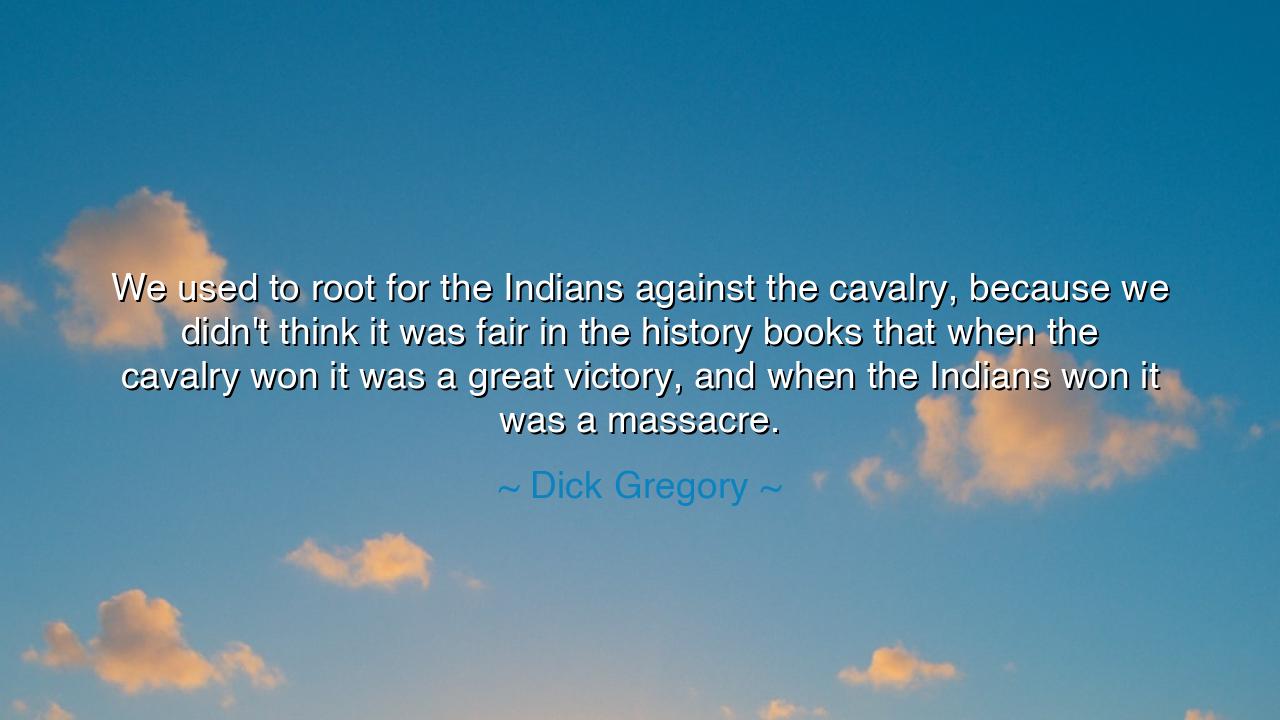
We used to root for the Indians against the cavalry, because we
We used to root for the Indians against the cavalry, because we didn't think it was fair in the history books that when the cavalry won it was a great victory, and when the Indians won it was a massacre.






The comedian and truth-teller Dick Gregory once spoke words that pierce through the veils of illusion: “We used to root for the Indians against the cavalry, because we didn’t think it was fair in the history books that when the cavalry won it was a great victory, and when the Indians won it was a massacre.” These words, though wrapped in the rhythm of humor, carry the fire of justice. For Gregory, a man who fought with laughter as others fought with swords, was not merely recalling a childhood sentiment — he was unmasking the deep injustice of perspective, the way history itself can be bent by the hands that write it.
What he saw, and what we must see, is that truth is not born from victory, but from honesty. In the telling of history, the same event may wear two names — one noble, one shameful — depending on who holds the pen. The cavalry, agents of empire, are praised for conquest; the Indians, defenders of their land, are condemned for resistance. Gregory’s observation reveals the ancient flaw of civilization: that power not only conquers the body but also claims dominion over the story. What is called a “great victory” by the victor becomes a “massacre” in the mouths of the conquered. Thus, injustice is not only done — it is remembered unjustly.
This double standard, though born in America’s frontier, echoes through all the ages. When the Romans crushed the Gauls, they called it civilization; when the Gauls struck back, they called it barbarism. When European empires spread across continents, they spoke of enlightenment, while the peoples they subdued were called savages. Dick Gregory, through the lens of a single sentence, exposed this hypocrisy and turned the mirror toward the reader. His was the voice of the prophet clothed in the humor of the jester — a man who could laugh at pain, yet never ignore it.
Consider the story of Wounded Knee, that tragic place where the Lakota Sioux, weakened and desperate, met the cavalry in 1890. When the smoke cleared, hundreds of Native men, women, and children lay dead — and the newspapers of the time proclaimed it a battle, a “necessary act” to preserve order. But when, years earlier, the Lakota had struck back against their invaders in defense of their homes, it was called a massacre. The same blood, the same loss, yet two names — one glorified, one condemned. In this we see what Gregory meant: that history is often not a record of truth, but a reflection of power’s convenience.
And yet, there is something noble in the act of rooting for the Indians — for it is the act of siding with the voiceless, the misrepresented, the forgotten. It is an act of conscience, of reclaiming fairness where the world has denied it. Gregory teaches us that to see justice, one must look not through the eyes of the victor, but through the tears of the fallen. To cheer for those labeled “enemy” by history is not rebellion; it is awakening — the realization that morality does not belong to the strong, but to the just.
In every generation, there are new “cavalries” and new “Indians.” The names change — nations, races, ideologies — but the pattern remains. Those with might write their triumphs as righteousness, and those who resist are branded as threats. Gregory’s wisdom urges us to break this cycle — to question the storyteller, to challenge the language that disguises oppression as order. For as long as words like “victory” and “massacre” are chosen by those who benefit from them, truth will remain half-buried beneath the soil of history.
Therefore, my child of the future, learn to read the world not as it is written, but as it was lived. When you study history, ask: Who was silenced? Whose story was left untold? Seek out the voices beneath the noise — the oppressed, the forgotten, the misunderstood. Do not be content with the comfort of one narrative; dig deeper until you find the human heart beneath both sides. Only then will you understand justice, not as a word, but as a living principle.
Let Dick Gregory’s words be a torch for your mind: When the powerful call something victory, ask whom it served. When they call something a massacre, ask who dared to fight back. For history, though written by the winners, can still be rewritten by the wise — by those who have the courage to see the past not as it was told, but as it truly was.






AAdministratorAdministrator
Welcome, honored guests. Please leave a comment, we will respond soon